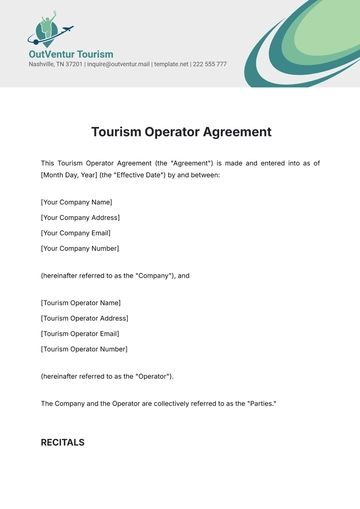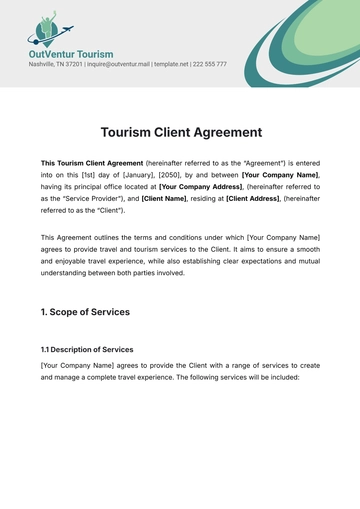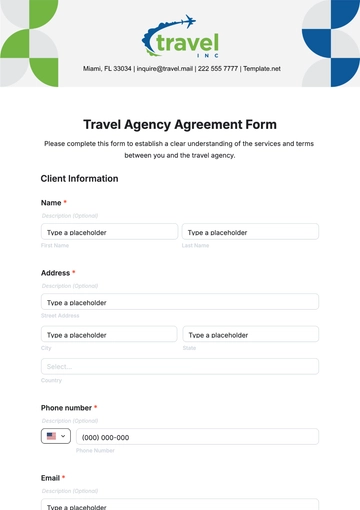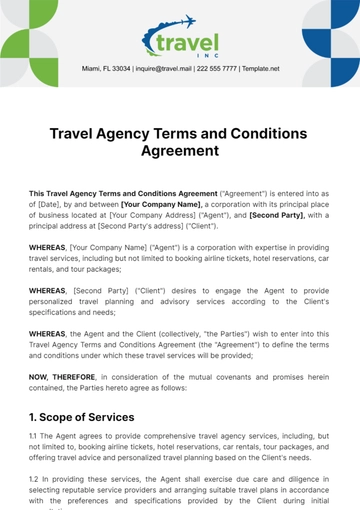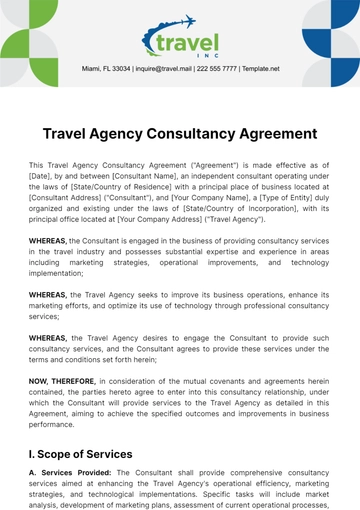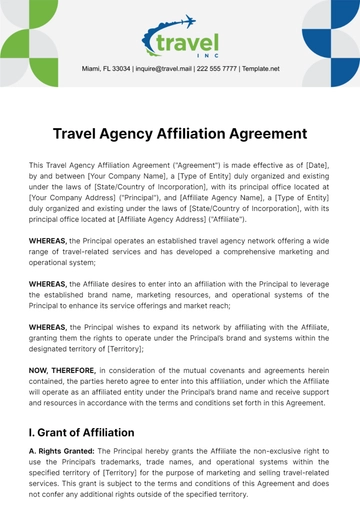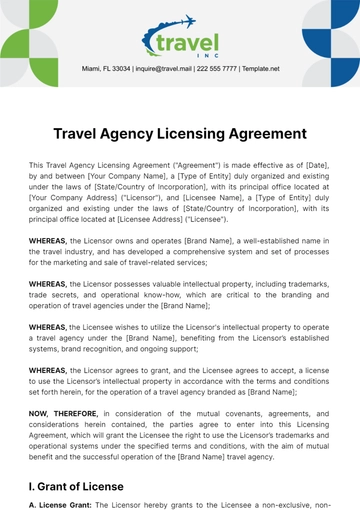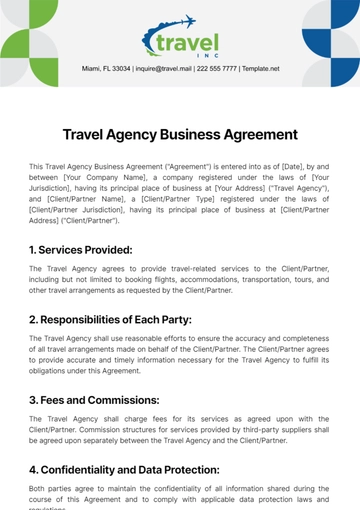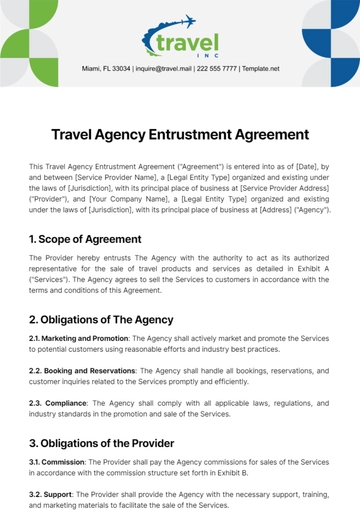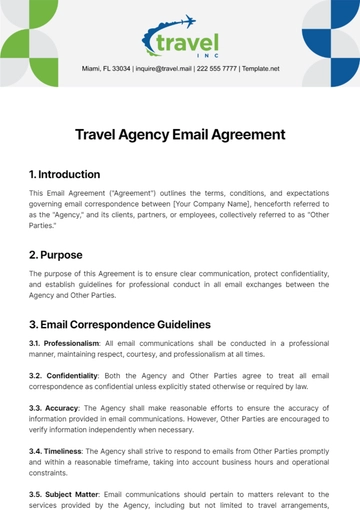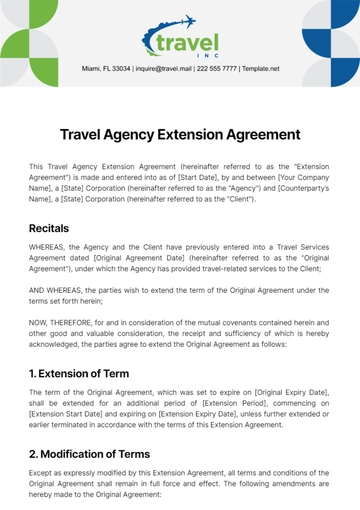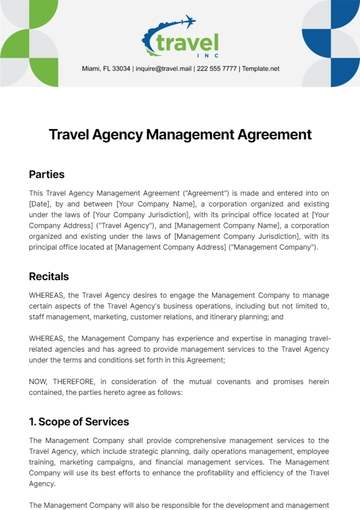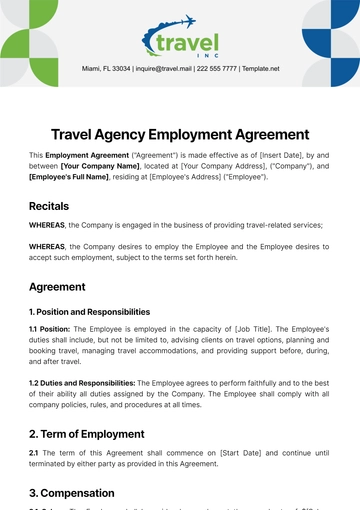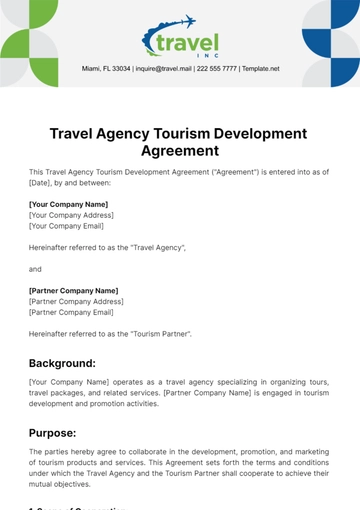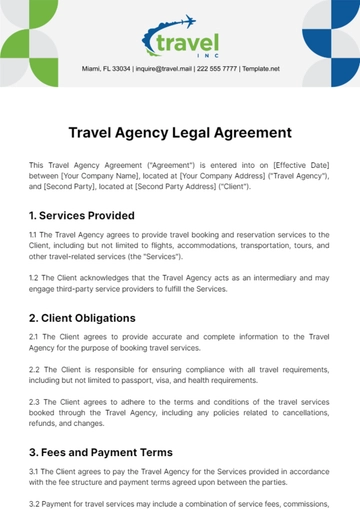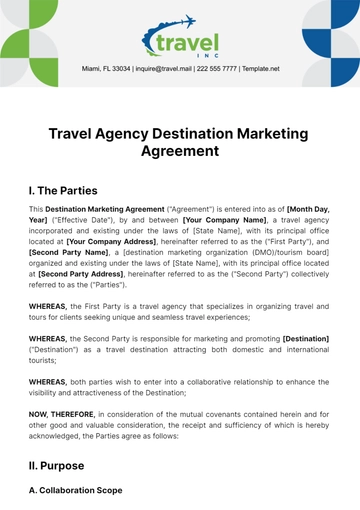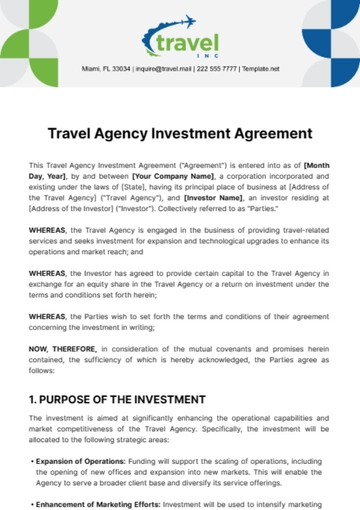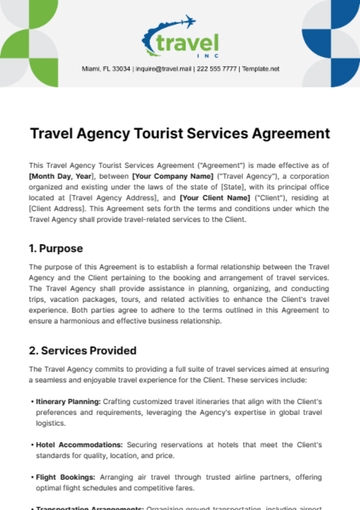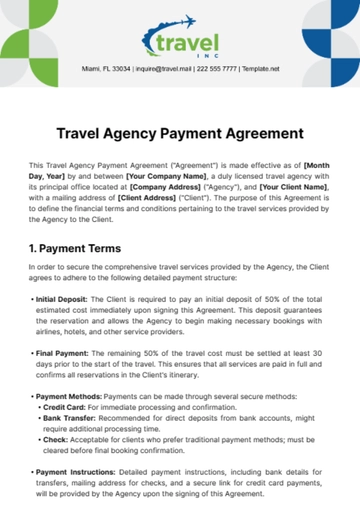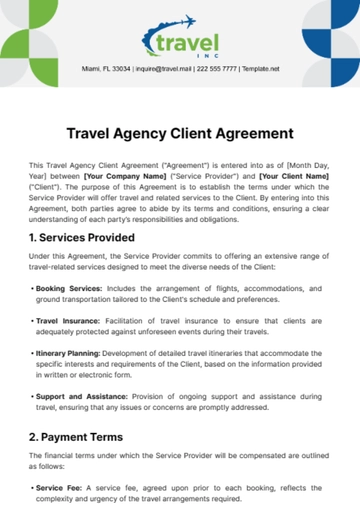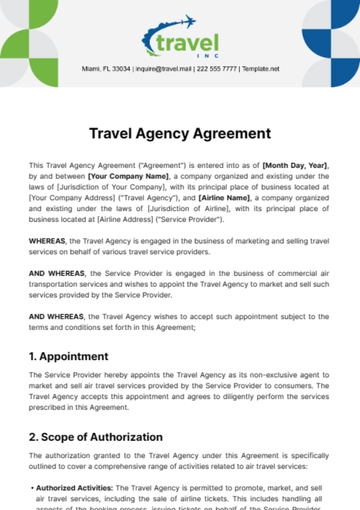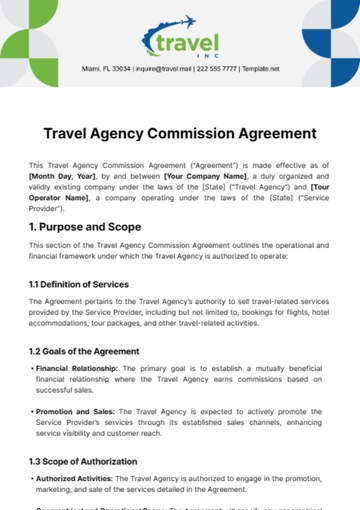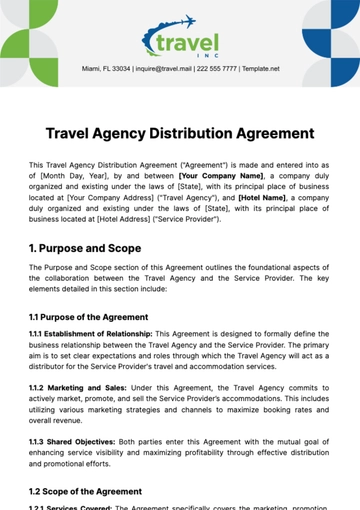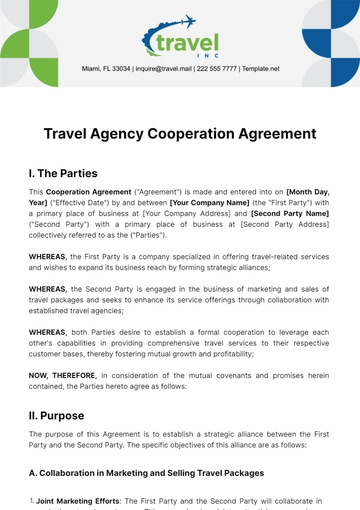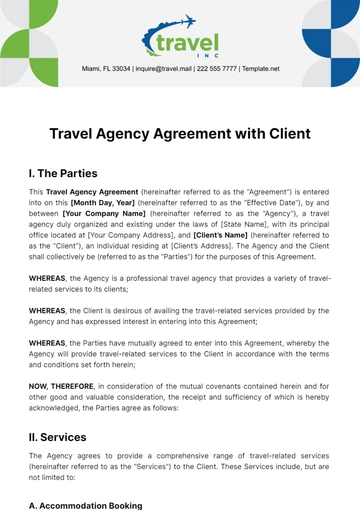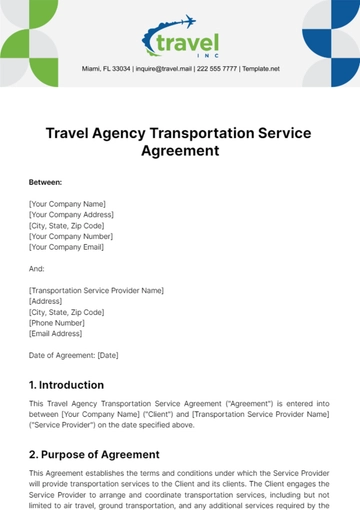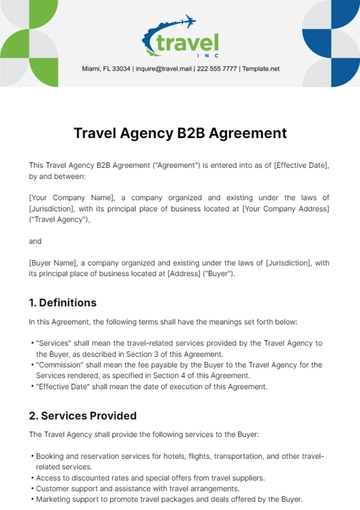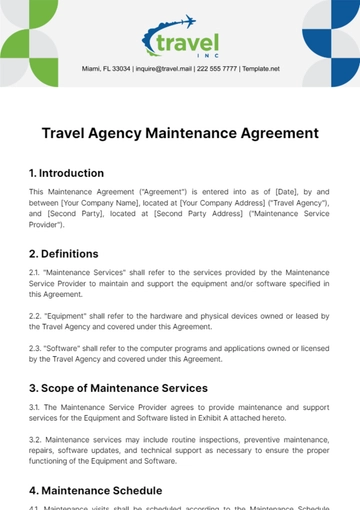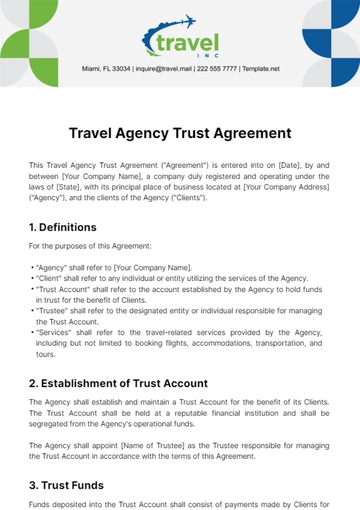Free Travel Agency Cooperation Agreement
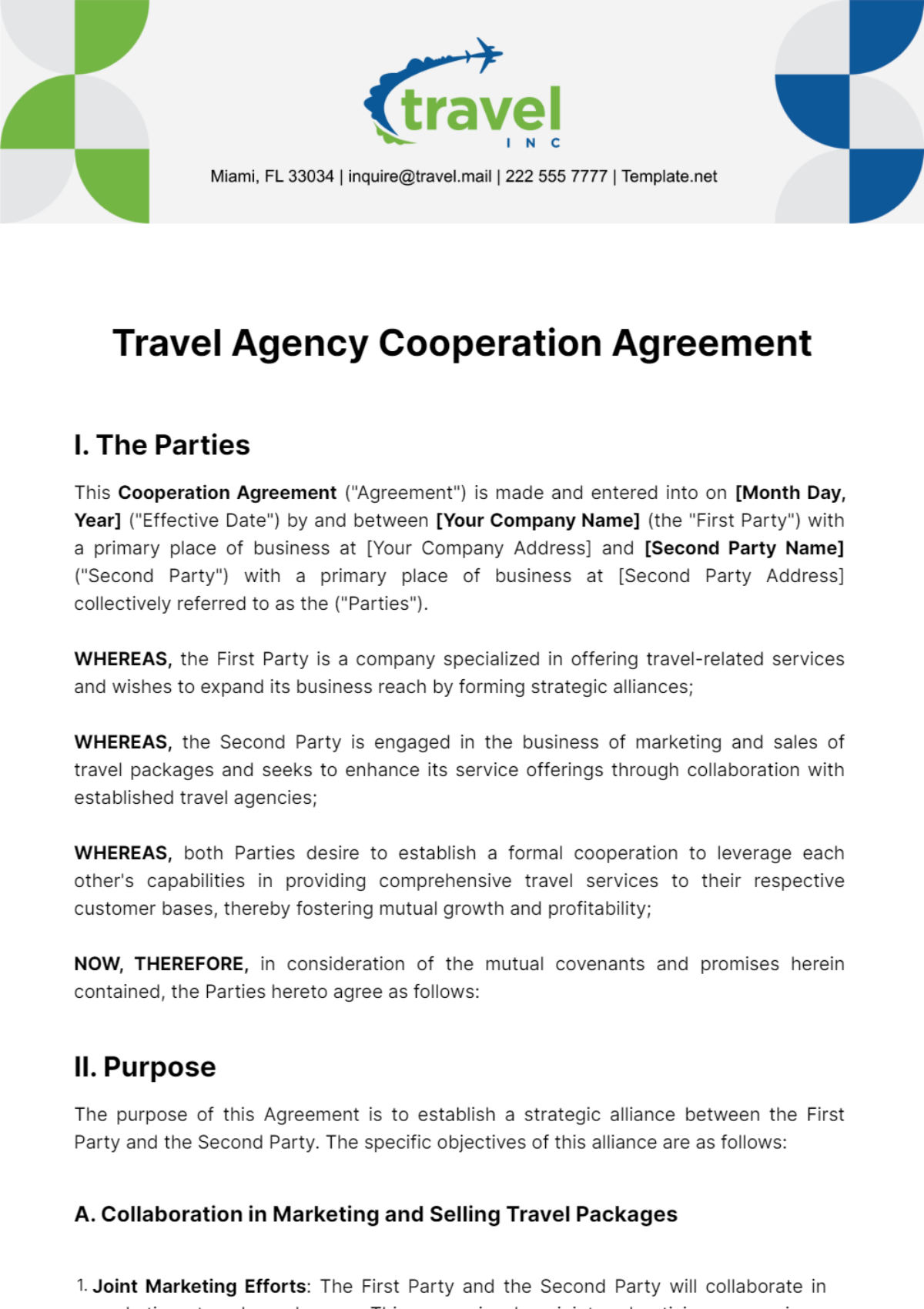
I. The Parties
This Cooperation Agreement ("Agreement") is made and entered into on [Month Day, Year] ("Effective Date") by and between [Your Company Name] (the "First Party") with a primary place of business at [Your Company Address] and [Second Party Name] ("Second Party") with a primary place of business at [Second Party Address] collectively referred to as the ("Parties").
WHEREAS, the First Party is a company specialized in offering travel-related services and wishes to expand its business reach by forming strategic alliances;
WHEREAS, the Second Party is engaged in the business of marketing and sales of travel packages and seeks to enhance its service offerings through collaboration with established travel agencies;
WHEREAS, both Parties desire to establish a formal cooperation to leverage each other's capabilities in providing comprehensive travel services to their respective customer bases, thereby fostering mutual growth and profitability;
NOW, THEREFORE, in consideration of the mutual covenants and promises herein contained, the Parties hereto agree as follows:
II. Purpose
The purpose of this Agreement is to establish a strategic alliance between the First Party and the Second Party. The specific objectives of this alliance are as follows:
A. Collaboration in Marketing and Selling Travel Packages
Joint Marketing Efforts: The First Party and the Second Party will collaborate in marketing travel packages. This may involve joint advertising campaigns, promotional events, and other marketing initiatives. By pooling their marketing resources and expertise, the Parties can create more effective marketing campaigns and reach a wider audience.
Sales Collaboration: The Parties will also work together in selling travel packages. This could involve cross-selling, where each party promotes the other’s services to its customers, or co-selling, where the parties work together to sell a combined service offering. This collaboration can lead to increased sales for both Parties.
Customer Reach: Through this collaboration, the Parties aim to expand their customer reach. By accessing each other’s customer bases, the Parties can reach a larger audience and attract more customers. This can lead to increased market share and revenue for both Parties.
B. Resource Sharing
Sharing of Expertise: The Parties will share their expertise and knowledge in their respective fields. This could involve sharing market insights, industry trends, and best practices. By sharing their expertise, the Parties can learn from each other and improve their own services.
Resource Optimization: The Parties will also share resources where possible to optimize their operations. This could involve sharing of personnel, facilities, or technology. By sharing resources, the Parties can reduce costs and improve efficiency.
Collaborative Problem Solving: When challenges arise, the Parties will work together to find solutions. This collaborative approach to problem-solving can lead to more effective and innovative solutions.
C. Mutual Growth and Profitability
Increased Sales: Through their collaboration in marketing and selling travel packages, the Parties aim to increase their sales volume. Increased sales can lead to increased revenue and profitability for both Parties.
Expanded Customer Base: By expanding their customer reach, the Parties can attract more customers. An expanded customer base can lead to increased sales and revenue.
Enhanced Service Offerings: By leveraging each other’s capabilities, the Parties can enhance their service offerings. This can lead to improved customer satisfaction and loyalty, which can in turn lead to increased sales and revenue.
III. Responsibilities of the Parties
The responsibilities of the First Party and the Second Party in this Cooperation Agreement are as follows:
A. Provision of Information
Detailed Information: The First Party shall provide detailed information about its travel services and packages to the Second Party. This includes information about pricing, availability, special offers, and any other relevant details.
Updates: The First Party shall regularly update the Second Party about any changes to its travel services and packages. This ensures that the Second Party has the most current information when promoting the First Party’s services.
Accuracy: The First Party shall ensure that all information provided to the Second Party is accurate and up-to-date. This helps to avoid any misunderstandings or miscommunications.
B. Promotion of Services
Marketing Channels: The Second Party shall use its marketing channels and resources to promote the First Party’s travel packages to a broader audience. This includes online and offline marketing channels, such as social media, email newsletters, print advertisements, and events.
Target Audience: The Second Party shall target its marketing efforts towards the audience that is most likely to be interested in the First Party’s travel packages. This includes demographics such as age, income level, and travel preferences.
Marketing Materials: The Second Party shall develop and distribute marketing materials that accurately represent the First Party’s travel packages. This helps to ensure a consistent and effective marketing message.
C. Handling of Bookings
Booking Process: The First Party will handle all bookings made through the Second Party. This includes processing customer inquiries, confirming reservations, and handling any changes or cancellations.
Customer Service: The First Party will ensure that all customer inquiries and reservations are processed efficiently and professionally. This includes responding to inquiries in a timely manner, providing accurate information, and resolving any issues that may arise.
Communication: The First Party will keep the Second Party informed about the status of bookings made through the Second Party. This helps to ensure a smooth and seamless booking process for the customers.
D. Feedback and Market Intelligence
Feedback: The Second Party agrees to provide timely feedback to the First Party about customer responses, market trends, and any other relevant information. This feedback can help the First Party enhance its travel packages and improve its services.
Market Intelligence: The Second Party will also provide market intelligence to the First Party. This includes information about competitor offerings, changes in customer preferences, and emerging trends in the travel industry.
Collaboration: The Parties will work together to analyze the feedback and market intelligence and make necessary adjustments to their services. This collaborative approach can lead to more effective and competitive travel packages.
E. Compliance with Laws and Regulations
Service Integrity: Both Parties agree to maintain the highest level of service integrity. This includes treating customers fairly, providing accurate information, and delivering on their promises.
Legal Compliance: Both Parties also agree to comply with all applicable laws and regulations pertaining to travel and tourism. This includes laws related to advertising, consumer protection, data privacy, and health and safety.
Licenses and Permits: Both Parties will ensure that they have all necessary licenses and permits to provide their services. This helps to ensure that all services are provided legally and professionally.
IV. Revenue Sharing
The revenue sharing arrangement between the First Party and the Second Party is as follows:
A. Commission on Bookings
Commission Rate: For every booking secured through the Second Party, the First Party agrees to pay a commission of [30]% of the total booking value. This commission is a reward for the Second Party’s efforts in promoting the First Party’s services and securing bookings.
Calculation of Commission: Commissions owed to the Second Party shall be calculated monthly. This calculation will be based on the total value of bookings secured through the Second Party during that month.
Payment of Commission: The First Party will pay the commissions to the Second Party within [30] days after the end of each month. This ensures that the Second Party receives its commissions in a timely manner.
B. Record Keeping
Sales Records: Both Parties will maintain accurate records of sales attributed to this Agreement. These records will include details of each booking, such as the date, value, and customer details.
Access to Records: Both Parties agree to make these records available to each other upon request. This allows both Parties to verify the accuracy of the sales records and the calculation of commissions.
Audit Rights: Each Party has the right to audit the other Party’s sales records to verify the accuracy of the commissions. Any such audit will be conducted in a manner that minimizes disruption to the other Party’s business.
C. Dispute Resolution
Good Faith Negotiations: Any disputes over commissions or bookings shall be resolved promptly in good faith negotiations between the Parties. This means that the Parties will discuss the dispute openly and honestly and try to reach a mutually acceptable solution.
Arbitration: If the Parties are unable to resolve the dispute through negotiations, they may agree to refer the dispute to arbitration. The arbitration process will be conducted in accordance with the dispute resolution clause of this Agreement.
Continued Performance: Despite the existence of a dispute, both Parties agree to continue performing their obligations under this Agreement to the best of their ability. This helps to ensure that the dispute does not disrupt the provision of services to the customers.
D. Review of Commission Rate
Annual Review: Adjustments to the commission rate can be reviewed annually. This allows the Parties to reassess the commission rate in light of their experience during the previous year and any changes in market conditions.
Negotiation of New Rate: If either Party believes that the commission rate should be adjusted, that Party can propose a new rate. The Parties will then negotiate in good faith to agree on a new rate.
Implementation of New Rate: Once a new rate is agreed upon, it will be implemented as of the date specified in the written agreement. All bookings secured after this date will be subject to the new rate.
Notification of New Rate: The Party that proposed the new rate will notify the other Party in writing of the new rate and the date it will take effect. This ensures that both Parties are aware of the new rate and can adjust their financial planning accordingly.
Disputes Over New Rate: If the Parties are unable to agree on a new rate, they will resolve the dispute in accordance with the dispute resolution clause of this Agreement.
Continued Performance: Despite any disputes over the commission rate, both Parties agree to continue performing their obligations under this Agreement to the best of their ability. This helps to ensure that any disputes over the commission rate do not disrupt the provision of services to the customers.
V. Term and Termination
The term and termination of this Cooperation Agreement are as follows:
A. Agreement Term
Commencement: This Agreement shall commence on the Effective Date and shall continue in effect for a period of [1] year. This fixed term provides both Parties with certainty and stability.
Extension: At the end of the initial term, the Agreement may be extended by mutual agreement of the Parties. This allows the Parties to continue their cooperation if they are satisfied with the arrangement.
Termination Before Expiry: If either Party wishes to terminate the Agreement before the expiry of the term, they may do so by providing written notice to the other Party.
B. Termination Notice
Right to Terminate: Either Party may terminate this Agreement upon giving [60] days written notice to the other Party. This gives the other Party sufficient time to adjust their plans and operations.
Notice Requirements: The notice of termination must be in writing and must clearly state the intention to terminate the Agreement and the effective date of termination.
Receipt of Notice: The Party receiving the notice of termination must acknowledge receipt of the notice in writing.
C. Settlement of Obligations
Ongoing Obligations: Upon termination, all ongoing obligations and dues will be settled within [90] days from the date of termination. This ensures that all outstanding matters are resolved in a timely manner.
Final Accounts: The Parties will prepare final accounts and settle any outstanding payments. This includes any unpaid commissions or other amounts due under the Agreement.
Return of Property: Upon termination, each Party must return any property of the other Party that it has in its possession. This includes any confidential information, customer lists, or marketing materials.
D. Survival of Obligations
Prior Obligations: Termination under this Article shall not affect any obligations incurred by either Party prior to the date of termination. This means that both Parties must fulfill any obligations that arose before the termination, such as payment for services rendered.
Surviving Provisions: Certain provisions of this Agreement, such as confidentiality and dispute resolution, will survive the termination of the Agreement. This means that the Parties must continue to comply with these provisions even after the Agreement has ended.
Post-Termination Cooperation: Both Parties agree to cooperate with each other after the termination to resolve any outstanding issues. This could include providing information, returning property, or assisting with customer inquiries.
E. Amendments
Proposal of Amendments: Either party may propose amendments to this Agreement. This allows the Parties to adjust the terms of the Agreement to reflect changes in their circumstances or objectives.
Agreement to Amendments: Proposed amendments shall become effective only when signed in writing by both Parties. This ensures that both Parties agree to the amendments.
Implementation of Amendments: Once the amendments have been agreed upon, they will be implemented as soon as practicable. The Parties will work together to ensure a smooth transition to the amended Agreement.
VI. Confidentiality
The Parties recognize the importance of maintaining confidentiality in their cooperation:
A. Confidentiality Obligation
Scope of Confidentiality: Each Party agrees to keep confidential all information received from the other Party that is not public knowledge. This includes, but is not limited to, customer data, pricing details, and marketing strategies.
Use of Confidential Information: The Parties agree to use such confidential information only for the purposes of performing under this Agreement. This prevents the misuse of confidential information for other purposes.
Non-Disclosure: The Parties agree not to disclose any confidential information to any third party without the prior written consent of the other Party. This helps to ensure the security and confidentiality of the information.
B. Survival of Confidentiality Obligation
Duration of Obligation: The obligation of confidentiality shall survive the termination of this Agreement and continue indefinitely. This means that the Parties must continue to protect the confidential information even after the Agreement has ended.
Breach of Confidentiality: Breach of confidentiality may result in immediate termination of this Agreement and potential legal action. This ensures that both Parties take their confidentiality obligations seriously.
Notification of Breach: If a Party becomes aware of a breach of the confidentiality obligations, it must immediately notify the other Party. This allows the Parties to take prompt action to address the breach and mitigate any potential damage.
C. Protection of Confidential Information
Security Measures: Both Parties shall implement appropriate security measures to protect the confidential information. This includes physical security measures, such as secure storage facilities, and digital security measures, such as encryption and password protection.
Access Control: Both Parties shall limit access to the confidential information to those employees and affiliates who need to know the information for the purposes of this Agreement. This helps to minimize the risk of unauthorized disclosure.
Confidentiality Training: Both Parties shall provide training to their employees and affiliates to ensure they understand and comply with these confidentiality provisions. This helps to ensure that everyone involved in the cooperation understands the importance of maintaining confidentiality.
Reporting of Breaches: Both Parties shall promptly report any breaches of confidentiality to the other Party. This allows the Parties to take immediate action to mitigate the impact of the breach.
Remedies for Breach: In the event of a breach of confidentiality, the non-breaching Party may seek legal remedies, such as an injunction to prevent further breaches and damages to compensate for any losses caused by the breach.
Return of Confidential Information: Upon termination of this Agreement, each Party must return or destroy all confidential information received from the other Party. This helps to ensure that the confidential information is not misused after the Agreement has ended.
VII. Governing Law
A. Choice of Law
Applicable Law: This Agreement will be governed by and construed in accordance with the laws of the [State Name]. This means that the laws of [State Name] will be used to interpret the terms of this Agreement and resolve any disputes.
Consistency with Laws: The Parties agree to ensure that their actions and the terms of this Agreement are consistent with these laws. This includes any laws related to travel services, consumer protection, and business operations.
Legal Advice: The Parties are advised to seek independent legal advice to ensure they understand the implications of the chosen governing law.
B. Jurisdiction
Court: Any legal actions, claims, or disputes arising under or in connection with this Agreement shall be subject to the exclusive jurisdiction of the courts of [State Name]. This means that any legal proceedings related to this Agreement will be conducted in [State Name].
Submission to Jurisdiction: By entering into this Agreement, both Parties agree to submit to the jurisdiction of the courts of [State Name]. This means that the Parties agree to resolve any legal disputes in [State Name], regardless of where they are based.
Enforcement of Judgments: Any judgment or order issued by the courts of [State Name] will be binding on the Parties and may be enforced in any jurisdiction where the Parties have assets.
VIII. Dispute Resolution
A. Friendly Consultation
Initial Dispute Resolution: In the event of any dispute arising out of or related to this Agreement, the Parties shall first attempt to resolve the dispute through friendly consultation. This means that the Parties will try to resolve the dispute by discussing it openly and honestly.
Time for Consultation: The Parties agree to spend a reasonable amount of time trying to resolve the dispute through consultation. This period will depend on the nature and complexity of the dispute.
Outcome of Consultation: If the Parties are able to resolve the dispute through consultation, they will document the resolution in writing. This document will be signed by both Parties and will be binding on them.
B. Binding Arbitration
Referral to Arbitration: If the Parties cannot resolve the dispute through consultation, they agree to submit the dispute to binding arbitration. This means that an independent arbitrator, rather than a judge, will decide the outcome of the dispute.
Arbitration Rules: The arbitration will be conducted in accordance with the rules of a recognized arbitration institution.
Arbitrator’s Decision: The award rendered by the arbitrator(s) shall be final and binding upon the Parties. This means that the Parties must comply with the arbitrator’s decision and cannot appeal it to a court.
Costs of Arbitration: Unless the arbitrator decides otherwise, each Party will bear its own costs in the arbitration. The Parties will share equally the fees of the arbitrator and the arbitration institution.
Confidentiality of Arbitration: The arbitration proceedings and the arbitrator’s decision will be kept confidential. This means that the Parties cannot disclose information about the arbitration to anyone not involved in the arbitration.
Continuation of Performance: Despite the existence of a dispute, the Parties must continue to perform their obligations under this Agreement to the extent possible. This means that a dispute does not excuse a Party from performing its obligations under the Agreement.
IX. Non-Solicitation
A. Non-Solicitation of Employees
No Solicitation: During the term of this Agreement and for a period of [1] year thereafter, neither Party shall solicit for employment any employees of the other Party who have been involved in the performance of this Agreement.
Scope of Non-Solicitation: This non-solicitation obligation applies to all forms of solicitation, including direct solicitation by the Party, indirect solicitation through a third party, and solicitation through advertisements or job postings.
Consent to Solicitation: Despite this non-solicitation obligation, a Party may solicit an employee of the other Party if it obtains the prior written consent of the other Party. This allows the Parties to make exceptions to the non-solicitation obligation in appropriate circumstances.
B. Respect for Employee Rights
Employee Choice: This non-solicitation obligation does not prevent employees of either Party from seeking employment with the other Party on their own initiative. This respects the employees’ right to choose their employer.
Compliance with Laws: The Parties agree to comply with all applicable laws and regulations relating to employment and non-solicitation. This includes respecting the rights of employees under labor laws and privacy laws.
C. Consequences of Breach
Breach of Non-Solicitation: If a Party breaches the non-solicitation clause, it may be liable for damages to the other Party. This could include the costs of recruiting and training a replacement employee.
Injunction: The non-breaching Party may also seek an injunction to prevent further breaches of the non-solicitation clause.
X. Entire Agreement
A. Entire Agreement
Inclusive Agreement: This Agreement constitutes the entire agreement between the Parties with respect to the subject matter hereof. This means that all terms, conditions, understandings, and agreements related to the subject matter are included in this Agreement.
Superseding Effect: This Agreement supersedes all prior agreements, understandings, negotiations, and discussions, whether oral or written, between the Parties.
Exclusion of Other Agreements: There are no other agreements, understandings, or representations, whether oral or written, between the Parties regarding the subject matter of this Agreement.
B. Acknowledgment of Understanding
Legal Advice: The Parties acknowledge that they have had the opportunity to seek independent legal advice before entering into this Agreement. This ensures that the Parties understand the legal implications of the Agreement.
Voluntary Agreement: The Parties acknowledge that they are entering into this Agreement voluntarily and without any duress or undue influence. This ensures that the Agreement is a true reflection of the Parties’ intentions.
C. Amendments to the Agreement
Requirement for Writing: Any amendments to this Agreement must be in writing. This ensures that there is a clear record of the amendments.
Mutual Agreement: Any amendments to this Agreement must be agreed upon by both Parties. This ensures that both Parties consent to the amendments.
Effect of Amendments: Once the amendments are agreed upon, they become part of this Agreement and have the same legal effect as the rest of the Agreement.
Notification of Amendments: The Party that proposed the amendments will notify the other Party in writing of the amendments and the date they will take effect. This ensures that the other Party is aware of the amendments and can adjust its operations accordingly.
Disputes Over Amendments: If there is a dispute over the interpretation of an amendment, the Parties agree to resolve the dispute in accordance with the dispute resolution clause of this Agreement. This ensures that any disputes over amendments are resolved in a fair and impartial manner.
XI. Signature
IN WITNESS WHEREOF, the Parties hereto have executed this Cooperation Agreement as of the Effective Date.
First Party

[Authorized Representative Name]
[Your Company Name]
Date: [Month Day, Year]
Second Party

[Second Party Name]
Date: [Month Day, Year]
- 100% Customizable, free editor
- Access 1 Million+ Templates, photo’s & graphics
- Download or share as a template
- Click and replace photos, graphics, text, backgrounds
- Resize, crop, AI write & more
- Access advanced editor
Foster successful partnerships with this editable Travel Agency Cooperation Agreement Template here on Template.net! This customizable document provides a framework for formalizing agreements between your agency and other businesses. Utilize our AI Editor Tool to customize the agreement and reflect your specific needs! Get started by accessing your copy now!
You may also like
- Lease Agreement
- Non Compete Agreement
- Rental Agreement
- Prenuptial Agreement
- Non Disclosure Agreement
- Operating Agreement
- Hold Harmless Agreement
- LLC Operating Agreement
- Arbitration Agreement
- Purchase Agreement
- Residential Lease Agreement
- Executive Agreement
- Confidentiality Agreement
- Contractor Agreement
- Partnership Agreement
- Postnuptial Agreement
- Collective Bargaining Agreement
- Loan Agreement
- Roommate Agreement
- Commercial Lease Agreement
- Separation Agreement
- Cohabitation Agreement
- Room Rental Agreement
- Child Custody Agreement
- Employee Agreement
- License Agreements
- Settlement Agreement
- Joint Venture Agreement
- Indemnity Agreement
- Subordination Agreement
- Sales Agreement
- Agreements Between Two Parties
- Business Agreement
- Real Estate Agreement
- HR Agreement
- Service Agreement
- Property Agreement
- Agreement Letter
- Restaurant Agreement
- Construction Agreement
- Finance Agreement
- Marketing Agreement
- Payment Agreement
- Investment Agreement
- Management Agreement
- Nonprofit Agreement
- Software Agreement
- Startup Agreement
- Agency Agreement
- Copyright Agreement
- Collaboration Agreement
- Reseller Agreement
- Car Rental Agreement
- Cleaning Services Agreement
- Consultant Agreement
- Deed Agreement
- Car Agreement
- Equipment Agreement
- Shares Agreement
- Data Sharing Agreement
- Advertising Agreement
- School Agreement
- Franchise Agreement
- Event Agreement
- Travel Agency Agreement
- Vehicle Agreement
- Board Resolution Agreement
- Land Agreement
- Binding Agreement
- Tenancy Agreement
- Exclusive Agreement
- Development Agreement
- Assignment Agreement
- Design Agreement
- Equity Agreement
- Mortgage Agreement
- Purchase and Sale Agreement
- Shareholder Agreement
- Vendor Agreement
- Royalty Agreement
- Vehicle Lease Agreement
- Hotel Agreement
- Tenant Agreement
- Artist Agreement
- Commission Agreement
- Consignment Agreement
- Debt Agreement
- Recruitment Agreement
- Training Agreement
- Transfer Agreement
- Apprenticeship Agreement
- IT and Software Agreement
- Referral Agreement
- Resolution Agreement
- Waiver Agreement
- Consent Agreement
- Partner Agreement
- Social Media Agreement
- Customer Agreement
- Credit Agreement
- Supply Agreement
- Agent Agreement
- Brand Agreement
- Law Firm Agreement
- Maintenance Agreement
- Mutual Agreement
- Retail Agreement
- Deposit Agreement
- Land Purchase Agreement
- Nursing Home Agreement
- Supplier Agreement
- Buy Sell Agreement
- Child Support Agreement
- Landlord Agreement
- Payment Plan Agreement
- Release Agreement
- Research Agreement
- Sponsorship Agreement
- Buyout Agreement
- Equipment Rental Agreement
- Farm Agreement
- Manufacturing Agreement
- Strategic Agreement
- Termination of Lease Agreement
- Compliance Agreement
- Family Agreement
- Interior Design Agreement
- Ownership Agreement
- Residential Lease Agreement
- Retainer Agreement
- Trade Agreement
- University Agreement
- Broker Agreement
- Dissolution Agreement
- Funding Agreement
- Hosting Agreement
- Investor Agreement
- Memorandum of Agreement
- Advisory Agreement
- Affiliate Agreement
- Freelancer Agreement
- Grant Agreement
- Master Service Agreement
- Parking Agreement
- Subscription Agreement
- Trust Agreement
- Cancellation Agreement
- Horse Agreement
- Influencer Agreement
- Membership Agreement
- Vacation Rental Agreement
- Wholesale Agreement
- Author Agreement
- Distributor Agreement
- Exchange Agreement
- Food Agreement
- Guarantee Agreement
- Installment Agreement
- Internship Agreement
- Music Agreement
- Severance Agreement
- Software Development Agreement
- Storage Agreement
- Facility Agreement
- Intercompany Agreement
- Lending Agreement
- Lodger Agreement
- Outsourcing Services Agreement
- Usage Agreement
- Assurance Agreement
- Photography Agreement
- Profit Sharing Agreement
- Relationship Agreement
- Rent To Own Agreement
- Repayment Agreement
- Volunteer Agreement
- Co Parenting Agreement
- HVAC Agreement
- Lawn Care Agreement
- SAAS Agreement
- Work from Home Agreement
- Coaching Agreement
- Protection Agreement
- Security Agreement
- Repair Agreement
- Agreements License
